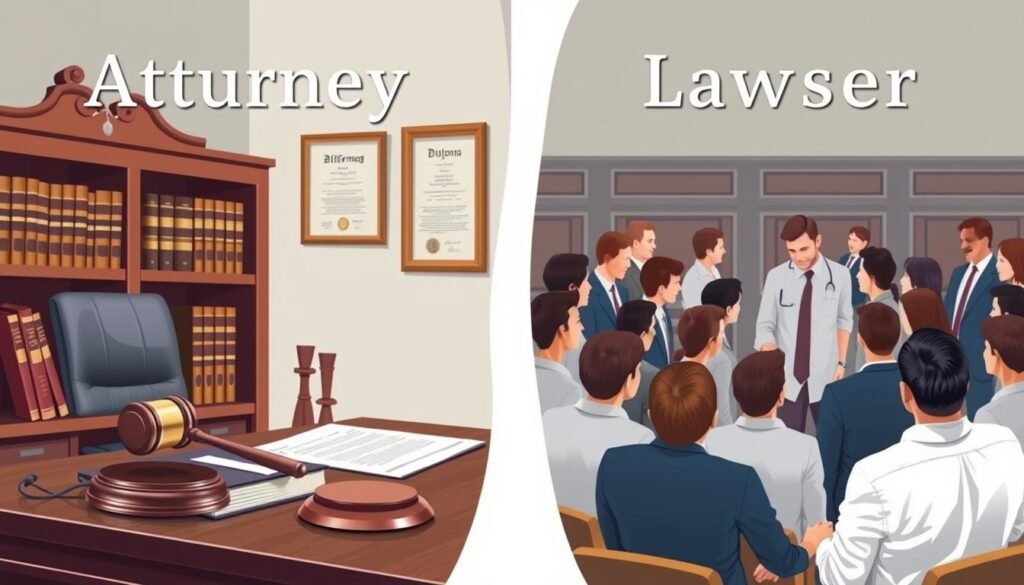Did you know that in the legal world, the difference between attorneys and lawyers is key? Attorneys can practice law, represent clients in court, and give legal advice. Lawyers, on the other hand, might not have passed the bar exam yet1. Knowing the difference is important when you need legal help or advice.
Attorneys have finished law school, passed the bar exam, and got licensed to practice law in a certain area1. Lawyers, though, are a wider term. They include anyone with a Juris Doctor (J.D.) degree from law school, but not all are licensed to practice law1.
Key Takeaways
- Attorneys can practice law, represent clients in court, and provide legal advice, while lawyers may not have passed the bar exam.
- Attorneys have completed law school, passed the bar exam, and been licensed to practice law in a specific jurisdiction.
- Lawyers have a J.D. degree but may not be licensed to practice law as attorneys.
- Understanding the differences between attorneys and lawyers is key when looking for legal help or advice.
- Things like licensing, experience, communication, availability, reputation, and costs can differ between attorneys and lawyers.
Attorney vs Lawyer: Comparing Definitions
The terms “lawyer” and “attorney” have different roots and roles in law. “Lawyer” comes from Middle English, meaning someone trained in law2. On the other hand, “attorney” is from French, meaning to act on behalf of others, showing a legal professional who represents clients in court.
The Etymology of “Lawyer” and “Attorney”
A lawyer has a law degree, known as a Juris Doctor (J.D.)2. They study many law areas, like contracts and criminal law. They can be legal advisors or researchers, not always in court.
Lawyer Definition: Educated and Trained in Law
An attorney, on the other hand, has passed the bar exam and is licensed to practice law3. They can represent clients in court, argue cases, and negotiate settlements. This requires formal licensing and bar admission.
Attorney Definition: Practitioner in a Court of Law
Lawyers and attorneys are both legal professionals, but with differences. Lawyers might focus on research or specific areas, while attorneys are licensed to represent clients in court.
| Lawyer | Attorney |
|---|---|
| Educated and trained in law, but may not be licensed to practice2 | Licensed to represent clients in court and perform other legal duties3 |
| May work as legal consultants, advisors, or researchers2 | Authorized to argue cases, negotiate settlements, and perform other legal proceedings3 |
| Holds a Juris Doctor (J.D.) degree2 | Has passed the bar exam and is licensed to practice law in a specific jurisdiction3 |
The origins and definitions of “lawyer” and “attorney” show their unique roles in law. Knowing these differences is key when looking for legal help or a career in law.
Roles and Responsibilities: Distinctions Between Attorneys and Lawyers
In the United States, “lawyer” and “attorney” are often used the same way4. But, they have different roles and duties. Lawyers have a JD degree and might not have passed the bar exam4. Attorneys, on the other hand, have passed the bar exam and can represent clients in court4.
Lawyers: Legal Advisors and Consultants
Lawyers give legal advice, do research, and draft documents4. They can specialize in areas like estate planning or taxation4. Even though they can’t represent clients in court, their legal knowledge is very valuable4.
Attorneys: Representing Clients in Court
Attorneys can represent clients in court, including trials and appeals4. They defend their clients, argue motions, and protect their rights4. Attorneys must follow strict rules to keep the legal system fair4.
It’s key to remember that not all lawyers are attorneys5. Many attorneys work in the courtroom5. Legal terms and state rules also affect what lawyers and attorneys do5.

In short, lawyers and attorneys both have legal education456. But, lawyers mainly give advice and draft documents. Attorneys focus on courtroom work and defending clients456.
attorney vs lawyer
To become an attorney, one must first get a Juris Doctor (J.D.) degree and then pass the bar exam in their chosen jurisdiction7. This process makes sure attorneys can give good legal help to their clients. On the other hand, lawyers might not have passed the bar exam or gotten a license8.
Attorneys follow a code of conduct and ethics, enforced by state bar associations7. These rules cover things like keeping client secrets and avoiding conflicts of interest7. Lawyers without a license might not face the same rules and ethics8.
Bar Admission and Licensing Requirements
In the U.S., all attorneys are lawyers, but not all lawyers are attorneys7. Lawyers give legal advice and help with documents, while attorneys often go to court for clients7. To be a lawyer, one needs an undergrad degree, three years of law school, and a bar exam in each state they want to practice7.
Attorneys: Bound by Professional Conduct Rules
Attorneys are key in criminal or civil trials, IRS claims, accidents, divorce, immigration, or medical malpractice7. Legal terms vary, like Solicitor (U.K.), Barrister (U.K.), or Counsel7. The choice between attorney and lawyer often depends on where you are in the U.S7..

| Characteristic | Attorneys | Lawyers |
|---|---|---|
| Bar Exam Requirement | Must pass the bar exam to practice law | Not required to pass the bar exam |
| Court Representation | Typically practice in court, representing clients | Often provide legal advice and act as advisors |
| Licensing | Must be licensed to practice law in a specific state | Do not need to be licensed to practice law |
| Legal Education | Must graduate from law school | Must graduate from law school |
In New York, “attorney” and “lawyer” mean the same thing, showing no difference9. To be licensed in New York, one must pass the state bar exam and meet other requirements9. New York attorneys must renew their license every two years and take continuing legal education9.
The attorney detail report in New York includes info like registration number, name, and business details9.
“Attorneys are relied upon when individuals are involved in criminal or civil cases going to trial, have claims against the IRS, need representation for accidents or divorce cases, immigration matters, or medical malpractice lawsuits.”
Personal injury attorneys handle cases of negligence or intentional harm9. Factors that can raise the value of a claim include getting medical help quickly and talking to a lawyer early9. Insurance companies might try to settle claims before treatment is finished or legal advice is sought9.
Law Offices of Jay S. Knispel Personal Injury Lawyers have two locations in New York City and Brooklyn for clients to schedule free consultations.978
Attorney-Client Privilege and Confidentiality
Attorneys and lawyers have a big difference in attorney-client privilege. Attorneys must keep communications confidential with their clients. This means these talks can’t be used as evidence in court10. But, not all lawyers are bound by the same rules, as they might not be licensed to practice law10.
Attorney-client privilege protects written and spoken talks from being shared in court or under similar laws11. It helps clients get legal advice without fear of it being shared. To qualify, talks must be private, between an attorney and client, and for legal advice11.
Attorney-client confidentiality is more about ethics. It stops attorneys from sharing client info unless it’s already known by others10. Exceptions include crimes about to happen or info that’s public10. Breaking these rules can lead to big penalties, like fines or losing a law license10.

The main difference between attorney-client privilege and confidentiality is in legal protection versus ethics10. Privilege keeps talks safe from being shared, while confidentiality is a moral duty. It keeps the legal field trustworthy and honest10.
| Attorney-Client Privilege | Attorney-Client Confidentiality |
|---|---|
| Legal protection of communications | Ethical duty to maintain client information |
| Covers confidential communications like legal advice, court order explanations, and other legal matters | Prohibits attorneys from disclosing client information unless reasonably known by others |
| Applies to work-related information or work product made or discovered during litigation | Exceptions include upcoming crimes or easily accessible public information |
| Exceptions where privilege does not apply include client attempts to conceal crimes or fraud and discussions in public settings | Violation can result in severe penalties like fines, censures, suspension, or disbarment |
| Can be waived by a client at any time | – |
In short, attorney-client privilege and confidentiality are key in the legal world. They make attorneys different from other legal experts. By following these rules, attorneys keep the legal system trustworthy and protect their clients’ privacy1011.
Other Legal Terminology: Solicitor, Barrister, Esquire
The legal world is filled with different professionals, each with their own role. Knowing about these roles helps you understand the legal system better. It also ensures you choose the right legal expert for your needs.
Solicitor: Administrative Legal Professional
In the UK and some places, a solicitor deals with the administrative side of law. They write legal documents, do research, and negotiate settlements12. Solicitors give legal advice but don’t usually go to court12. Their work supports legal cases.
Barrister: Courtroom Advocacy Specialist
A barrister is found in the UK and some other places. They focus on courtroom work, like criminal or family law12. Barristers argue cases and give expert advice12.
Esquire: Honorary Title for Licensed Attorneys
“Esquire” (or “Esq.”) shows someone has passed the bar exam and can practice law13. In the US, it’s a common title for lawyers, but rules vary by state13. In the UK, it’s more for educational titles14.

Knowing about these legal titles is key for finding the right lawyer. The right lawyer can greatly affect your legal case’s outcome13. Learning about these roles helps you make better choices for your legal needs.
| Legal Profession | Primary Responsibilities | Typical Jurisdiction |
|---|---|---|
| Solicitor | Drafting legal documents, conducting research, negotiating settlements | United Kingdom, some other countries |
| Barrister | Courtroom advocacy and representation, often in specialized areas of law | United Kingdom, some other countries |
| Esquire (Esq.) | Honorary title indicating a licensed attorney | United States, some other countries |
Education and Training for Lawyers and Attorneys
To become a licensed attorney or lawyer, you need to invest a lot of time and effort. Both lawyers and attorneys must get a Juris Doctor (J.D.) degree. This usually takes seven years, with four years of undergrad and three years of law school15.
There’s no specific undergrad major needed to become an attorney. But, degrees in political science, criminal justice, history, and philosophy are recommended. They help develop critical thinking and analytical skills needed for law school15. A high GPA and extracurricular activities during undergrad are also key15.
The Law School Admissions Test (LSAT) is a big exam. It tests reading, reasoning, and writing skills, all important for law school15. After law school, you must pass the bar exam to get licensed15.
Continuing Legal Education (CLE) for Attorneys and Lawyers
After becoming licensed, lawyers must keep learning through Continuing Legal Education (CLE) courses16. These courses help them stay current with legal changes. They ensure lawyers can give top-notch legal services16.
The education and training for lawyers and attorneys is long and hard. But, it’s vital. It makes sure they can represent clients well and meet the legal profession’s high standards17.
Attorney vs Lawyer in Legal Specializations
Attorneys and lawyers often choose to specialize in certain areas of law. These legal specializations include family law, corporate law, and more. They can also focus on intellectual property, criminal defense, and personal injury18.
Attorneys can represent clients in court. They advocate for their clients in various practice areas. Lawyers, on the other hand, give detailed legal advice and do deep legal research. They might not always go to court18.
Practice Areas for Attorneys and Lawyers
- Family Law: Divorce, child custody, adoption, and other domestic matters
- Corporate Law: Mergers, acquisitions, contracts, and business transactions
- Intellectual Property: Patents, trademarks, copyrights, and licensing agreements
- Criminal Defense: Representation of individuals accused of criminal offenses
- Personal Injury: Seeking compensation for those injured due to negligence or accidents
Both attorneys and lawyers are key in the legal world. They help clients navigate complex legal issues. They make sure clients’ interests are protected18.
“Understanding the nuances between attorneys and lawyers is key to getting the right legal help.”
Selecting the Right Legal Professional
Understanding the difference between attorneys and lawyers is key when dealing with legal issues. It’s important to look at their licensing, experience, and expertise to find the right fit19. Also, discussing fees and costs upfront is vital for making a good choice19.
Licensing and Experience Considerations
In the U.S., over 1.3 million lawyers can represent clients in court20. To practice law in states like Florida, lawyers must join the state bar, have a law degree, and pass the bar exam19. Experienced lawyers offer a wide range of services, from estate planning to criminal defense. Those without proper licensing are limited in what they can do19.
Fees and Cost Factors
The cost of hiring a lawyer can vary a lot. It depends on the legal issue’s complexity, the lawyer’s experience, and their fee structure. Lawyers might charge by the hour or work on a contingency fee basis20. Lawyers might offer more flexible fees or general advice at a lower cost20. Knowing the costs upfront is key to choosing the right lawyer for your case.
| Criteria | Attorneys | Lawyers |
|---|---|---|
| Licensing | Must be a member of the state bar association, hold a law degree, and pass the bar exam19. | May have a law degree but not necessarily be licensed to practice law in a specific state20. |
| Legal Services | Can provide a full range of legal services, including representation in court19. | May be limited in the legal services they can offer without proper licensing20. |
| Fees | May charge hourly rates or work on a contingency fee basis20. | May have more flexible fee arrangements or provide general legal advice at a lower cost20. |
“Selecting the right legal professional is essential to ensure your legal matter is handled effectively and efficiently. Understanding the key differences between attorneys and lawyers can help you make an informed decision that best meets your needs.”
By looking at licensing, experience, and fees, you can choose the right lawyer for your needs and budget. Whether you need courtroom help, legal advice, or help with a specific issue, taking time to compare options is important1920.
Attorney vs Lawyer: Key Distinctions Summarized
The main difference between attorneys and lawyers is in their licensing and legal representation. Both know a lot about the law. But, only attorneys can represent clients in court and handle legal cases21.
Lawyers have gone to law school but might not be licensed. Attorneys, on the other hand, have finished law school, passed the bar, and got a license to practice in a certain area21.
Attorneys can write legal documents, give detailed legal advice, and fight for their clients in court. They must follow strict rules and keep their licenses to keep practicing21.
In different countries, legal professionals might be called barristers or solicitors instead of attorneys or lawyers22. But, the main difference is the same: they are licensed to fully represent and advocate for clients.
When picking a legal professional, look at their area of expertise, experience, and if they are licensed21. Also, consider their communication skills, how available they are, their success in similar cases, and their reputation with the state bar21.
| Attribute | Lawyer | Attorney |
|---|---|---|
| Legal Education | Graduated from law school | Graduated from law school and passed the bar examination |
| Licensing | May or may not hold a license to practice law | Holds a valid license to practice law in a specific jurisdiction |
| Legal Representation | May provide legal advice and consultation | Can represent clients in legal proceedings and advocate on their behalf in court |
| Median Annual Wage (U.S.) | $126,93023 | $126,93023 |
In summary, the main differences between attorneys and lawyers are in their licensing, legal representation, and professional conduct. Knowing these differences helps people choose the right legal counsel and representation.
Conclusion
The terms “attorney” and “lawyer” are often used together, but they have key differences24. Attorneys are lawyers who can act as legal representatives. They can sign documents, negotiate, and represent clients in court25. Lawyers, on the other hand, have law degrees and passed the bar exam. But they might not be allowed to practice law or represent clients in court24.
When you need legal help, it’s important to check the professional’s qualifications and expertise25. Litigators, for example, specialize in court cases and are great at trial advocacy25. Knowing the difference between attorneys and lawyers helps you choose the right legal help for your needs.
Finding your way through the legal system can be tough, but understanding the difference helps24. Whether it’s a civil case, corporate law, or any legal issue, knowing the roles of attorneys and lawyers is key. It ensures you get the legal advice and help you need25.
FAQ
What is the key difference between an attorney and a lawyer?
What is the origin of the terms “lawyer” and “attorney”?
What are the responsibilities of a lawyer versus an attorney?
What are the licensing requirements for attorneys and lawyers?
How are attorneys bound by professional conduct rules?
What is the significance of attorney-client privilege?
What other legal professional titles are there, and how do they differ?
What are the educational and training requirements for attorneys and lawyers?
How do attorneys and lawyers specialize in different areas of the law?
What factors should be considered when choosing between an attorney or a lawyer?
Source Links
- Attorney vs Lawyer: What’s the Difference & Which Do You Need? – https://westcoasttriallawyers.com/differences-between-attorney-vs-lawyer
- What is the Difference Between a Lawyer and an Attorney? – https://www.malmlegal.com/personal-injury/what-is-difference-between-attorney-lawyer-legal-terms-defined/
- Attorney vs Lawyer: what’s the difference? – https://juro.com/learn/attorney-vs-lawyer
- Attorney vs Lawyer – https://onlinemasteroflegalstudies.com/career-guides/become-a-lawyer/attorney-vs-lawyer/
- Attorney vs. Lawyer | Differences & Definitions – https://www.lawfirm.com/terms/attorney-vs-lawyer/
- Attorney vs. Lawyer – Explained by a Lawyer – https://www.juriseducation.com/blog/attorney-vs-lawyer
- Attorney vs Lawyer: Which Do I Need? – https://www.dolmanlaw.com/blog/attorney-and-lawyer-difference/
- What Is the Difference Between an Attorney and a Lawyer? – Dean Price Law Springfield, Missouri – https://deanpricelaw.com/blog/what-is-the-difference-between-an-attorney-and-a-lawyer/
- What Is The Difference Between An Attorney And a Lawyer? – https://jknylaw.com/blog/what-is-the-difference-between-lawyer-and-attorney/
- Attorney-Client Privilege vs. Confidentiality: What’s the Difference? | Schwartzapfel® Lawyers P.C. – https://www.fightingforyou.com/resource-center/articles/attorney-client-privilege-vs-confidentiality/
- Attorney-Client Privilege | Leadership – https://leadership.oregonstate.edu/general-counsel/attorney-client-privilege
- The difference between attorneys, lawyers, solicitors and barristers. – https://www.linkedin.com/pulse/difference-between-attorneys-lawyers-solicitors-teixeira-castelo-gb0fe
- Understanding the Terms Lawyer, Attorney & Esquire – https://ehlinelaw.com/blog/differences-attorney-lawyer
- Lawyer – https://en.wikipedia.org/wiki/Lawyer
- What Education is Required to Be a Lawyer? – https://www.clio.com/blog/education-required-to-be-a-lawyer/
- Attorney vs Lawyer | The Differences are in the Definitions – https://www.lawyeredu.org/attorney-vs-lawyer/
- What is the Difference Between an Attorney and a Lawyer? | The Barnes Firm – https://www.thebarnesfirm.com/what-is-the-difference-between-an-attorney-and-a-lawyer/
- Attorney vs. Lawyer | The Difference Between The Two Terms – https://testmaxprep.com/blog/bar-exam/attorney-vs-lawyer
- How Are an Attorney and Lawyer Different? – https://fldivorce.com/blog/how-are-an-attorney-and-lawyer-different/
- Attorney vs. Lawyer: Key Differences Explained by Muller Brazil – https://www.mullerbrazil.com/personal-injury-lawyer/blog/attorney-vs-lawyer
- Lawyer vs. Attorney: What Are the Differences? | Lawrina – https://lawrina.org/match/lawyer-vs-attorney-what-are-the-differences/
- Attorney vs Lawyer: Understanding the Key Distinctions – https://www.ryanhugheslaw.com/articles/attorneys-and-lawyers
- Attorneys vs. Lawyers – Reveling The Actual Distinctions – https://thewestlawfirm.com/blog/2023/7/14/attorneys-vs-lawyers-reveling-the-actual-distinctions
- Attorney vs. Lawyer – https://www.grammar.com/attorney_vs._lawyer
- Difference Between a Litigator, Lawyer, and Attorney – MatterSuite – https://www.mattersuite.com/blog/litigator-vs-lawyer-vs-attorney/
